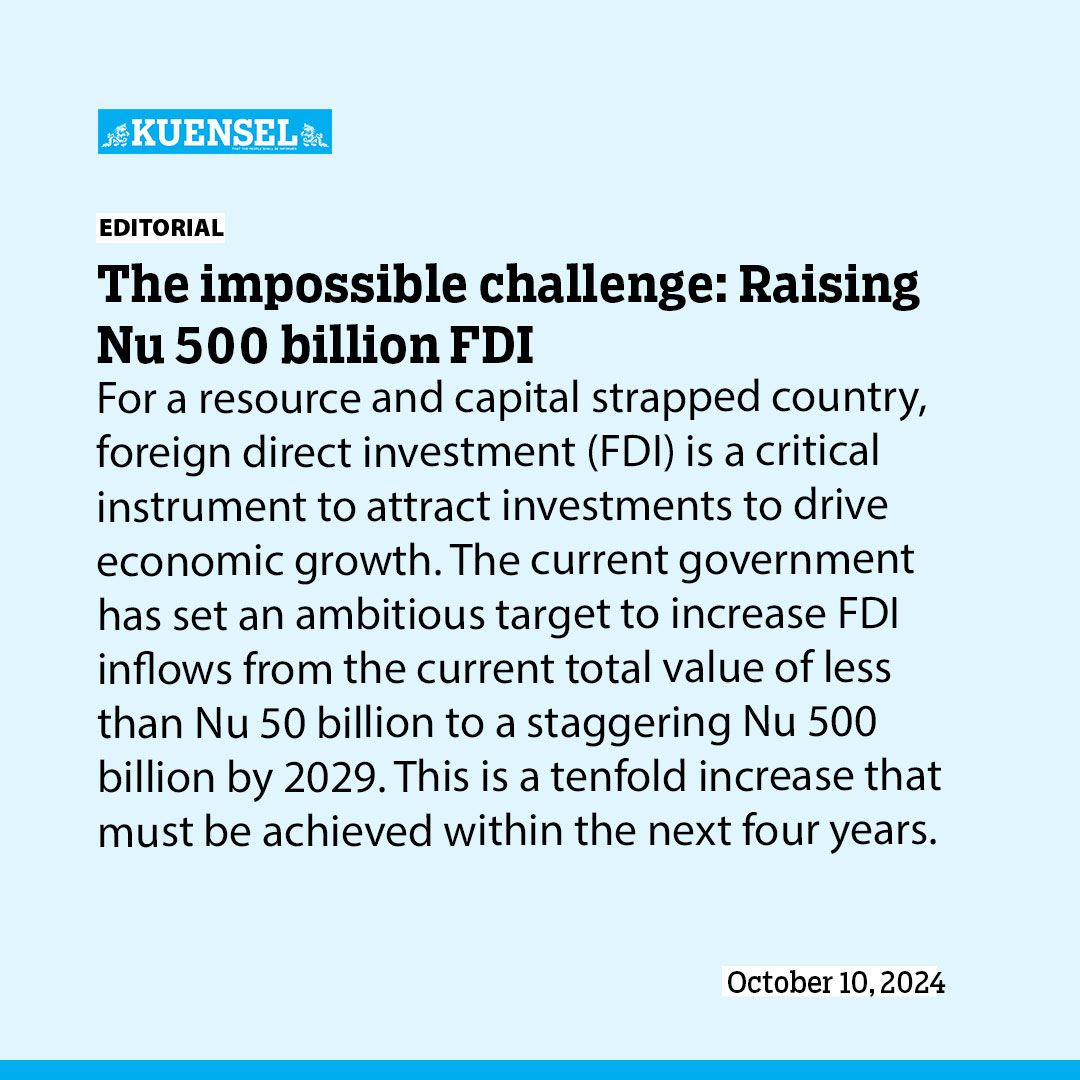For a resource and capital strapped country, foreign direct investment (FDI) is a critical instrument to attract investments to drive economic growth. The current government has set an ambitious target to increase FDI inflows from the current total value of less than Nu 50 billion to a staggering Nu 500 billion by 2029. This is a tenfold increase that must be achieved within the next four years.
It is by all measure a really ambitious goal. And going by past trends, achieving this target will be anything but an easy task.
While we have carefully crafted our unique value propositions—political stability, a pristine environment, unique culture, and well-educated English-speaking workforce—these factors have not translated into a voluminous inflow of foreign investments. Up until last year, the total value of FDI stood at Nu 48.61 billion—a marginal increase from Nu 43.62 billion in 2022.
Bhutan’s current FDI landscape is marred with several bottlenecks: an unfriendly investment climate, a slow-moving bureaucracy, government agencies functioning in silos, the lack of inter-agency cooperation, lengthy processes, and inefficient and indifferent government officials. The list goes on.
There are stories aplenty of foreign businesses facing significant delays and hurdles. For instance, an FDI company planning to build a large resort in Paro has taken over a year to acquire land, transfer ownership, and receive clearance from various government agencies. The company is still mired in thick layers of bureaucracy, let alone start construction of the resort. That’s how bad things are.
This speaks volumes about our bureaucratic culture that often obstructs rather than facilitates investments. The question is why would any foreign investor come to Bhutan with such an unfavourable investment climate. Not just Bhutan, the entire region is competing to attract FDI. If we don’t change, and soon enough, even those who are willing to invest might leave.
The current practice of requiring special permits for foreign investors to travel beyond Thimphu and Paro further adds to the perception that Bhutan is an unwelcoming destination for business.
The government’s new draft FDI policy, which is awaiting cabinet approval, does address many of the systemic issues that have plagued foreign investments in the country.
For instance, the draft FDI rules offer ‘investor cards’ to foreign investors or their authorised representatives making investments over Nu 20 million. Along with this comes a one-year residency, which can be extended annually, and includes provisions for spouses and dependents. The investor’s spouse can also obtain a work permit and the family can study in Bhutan without separate visas.
The draft regulation also encourages the establishment of venture capital funds to invest in impact startups, with 100 percent equity permitted.
The revised FDI rules have taken steps toward making the financial environment more conducive to investment, especially by allowing foreign companies to access convertible currencies and simplifying the repatriation of dividends.
The new FDI rules also allow 100 percent foreign equity particularly in agriculture, healthcare, and renewable energy sectors.
While these reforms are crucial to achieve the ambitious target, not much can be achieved without a fundamental overhaul of the bureaucratic processes. What we need is a major shift from the culture of bureaucratic inertia to one that is responsive and efficient. We need to create a business-friendly environment that not only attracts but also retains FDI.
Raising Nu 500 billion FDI within the next four years will be next to impossible if we stick to our current business-as-usual approach.


